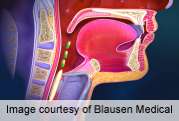For patients with esophageal or esophagogastric-junction cancer, treatment with neoadjuvant chemoradiotherapy followed by surgical resection is associated with improved survival compared with surgery alone, according to a study published in the May 31 issue of the New England Journal of Medicine.
(HealthDay) -- For patients with esophageal or esophagogastric-junction cancer, treatment with neoadjuvant chemoradiotherapy followed by surgical resection is associated with improved survival compared with surgery alone, according to a study published in the May 31 issue of the New England Journal of Medicine.
Peter van Hagen, M.C.C.M., from the Erasmus University Medical Center in Rotterdam, Netherlands, and colleagues investigated the role of neoadjuvant chemoradiotherapy in the treatment of 366 patients with resectable esophageal or esophagogastric-junction cancer (275 with adenocarcinoma, 84 with squamous-cell carcinoma, and seven with large-cell undifferentiated carcinoma). Participants, enrolled from March 2004 through December 2008, were randomly allocated to receive surgery alone (188 patients) or to receive carboplatin and paclitaxel for five weeks with concurrent radiotherapy, followed by surgery (178 patients).
The researchers found that 92 percent of patients in the chemoradiotherapy-surgery group achieved complete resection with no tumor within 1 mm of the resection margins, compared with 69 percent in the surgery-alone group. Twenty-nine percent of patients who underwent resection after chemoradiotherapy achieved a pathological complete response. In the two treatment groups, postoperative complications were similar, with 4 percent in-hospital mortality in both groups. The median overall survival was 49.4 and 24.0 months in the chemoradiotherapy-surgery and surgery-alone groups, respectively. In the chemoradiotherapy-surgery group, overall survival was significantly improved (hazard ratio, 0.657; P = 0.003).
"Preoperative chemoradiotherapy (five courses of carboplatin and paclitaxel, with 41.4 Gy of concurrent radiotherapy) is safe and leads to a significant increase in overall survival among patients with adenocarcinoma or squamous-cell carcinoma of the esophagus or esophagogastric junction," the authors write.
More information: Full Text (subscription or payment may be required)
Journal information: New England Journal of Medicine
Copyright © 2012 HealthDay. All rights reserved.



















